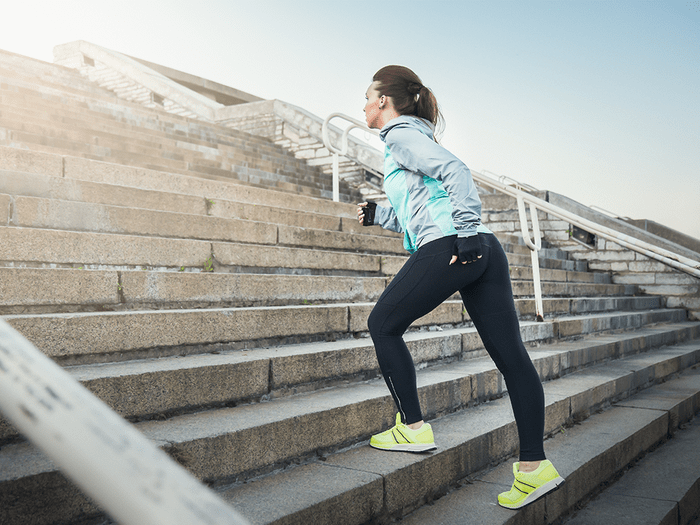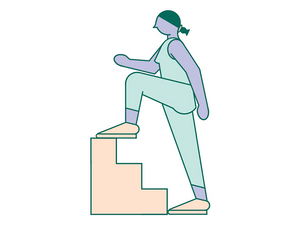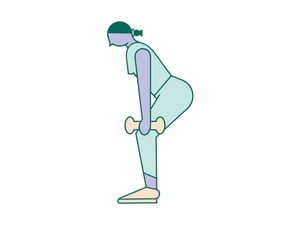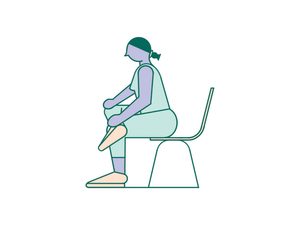3 Moves to Stretch and Strengthen Your Glutes After Sitting All Day

When we sit for too long, our glutes shut down. Luckily, everyday movement can strengthen them.
If you have a desk job, chances are you’re sitting down for most of the day. When you get up for a second (or third) cup of coffee, you might find that your tush is a little sore—that’s because when we sit, our glutes shut down.
Your glutes are made up of three different muscles (the maximus, the medius and the minimus) and together they are the largest muscle group in your body. The glutes are important—they help with balance and mobility, walking upstairs and uphill, carrying and lifting and keeping us upright. “They’re important to keep strong, especially as we age, especially as we try to prevent falls and stay as active as we can,” says Surabhi Veitch, a Toronto-based virtual physiotherapist and owner of the Passionate Physio.
With many of us working from home and living more sedentary lifestyles thanks to the pandemic, we aren’t using our glutes as often as we should. If you were an office worker before COVID, it’s likely that your day consisted of a lot more built-in movement: you might’ve walked to and from work; maybe you climbed the stairs in your apartment building whenever you went out; you most definitely stood around more, waiting for buses or coffees or your table at a restaurant. That loss of daily movement “has really contributed to deconditioning and the glutes have atrophied,” says Veitch. “When we start losing muscle mass like that, especially as we age, it’s really challenging to get that muscle back. We have to be really intentional about strengthening those muscles.”
Luckily, many of the things we do every day work our glutes. If you want to strengthen them, start by repeating, and adding difficulty to, some of the movements you do daily. Veitch suggests squats, which we do without thinking whenever we stand up from a seated position. Try adding in extra squats by doing 10 or 15 every time you sit down for a meal—sit down onto your chair, stand back up and repeat. “Just go down to chair height,” Veitch says. To add difficulty, you can go lower, like onto a stool or an ottoman, or try without a chair. Ideally, you would want to be able to get all the way down to the floor. One of the things Veitch works on with her elderly clients is getting down to the floor and then back up.
(Related: 4 Stretches to Improve Range of Motion as You Age)
Another daily action you can leverage for glute strength is step-ups, and all you need is a set of stairs. While the gluteus maximus helps with moving forward and climbing upwards, the gluteus medius and minimus help with hip stability and balance. To work those particular muscles, go up the stairs sideways. Strengthening gluteus medius and minimus “prevents strain on the knee and lower back, and keeps our hips more level,” Veitch says.
Dead lifts, which are commonly done at the gym with dumbbells, are another functional workout you can add to your daily routine. Like squats and step-ups, you’re likely doing dead lifts all the time without even noticing. “When you drop something in the kitchen, you’re most likely going to dead lift to pick it up,” says Veitch. “The problem is that most people just stand with their legs straight and bend from their back.” When you get into the habit of bending from the back while picking things up, you’re not training the glute muscles you need to lift with and you may be more likely to strain (or worse, injure) your lower back.
Aside from strengthening your glutes, stretching them after a day of sitting is hugely important. Tight glutes can lead to discomfort throughout your body, including lower back pain, pelvic pain and a feeling of tightness in the hips and hamstrings. Plus, releasing glute tightness may help with flexibility and range of motion, and reduce your risk of injury. “Sometimes, when your muscles are tight, other muscles may compensate,” says Ivana Sy, a kinesiologist and physiotherapy student. This can lead to muscle imbalances or compensation patterns, like lifting with the lower back instead of with the core or glutes, which can lead to injuries. To stretch one area of your glutes, Sy recommends doing a simple seated piriformis stretch, which is often also called a seated figure-four stretch. Or try rolling out the glutes with a foam roller or lacrosse ball to get all the muscles in one session.
“If we start to integrate these movement patterns—these ‘exercises’—into our day, we’re getting more movement in without even having to set aside time,” Veitch says. So even if you’re tied to your desk or home, repeating motions you already do or working in more opportunities for movement, like taking a few laps up and down the stairs while going down to the kitchen for a snack, can have an outsized impact on your glute strength and flexibility. Ultimately, having buns of steel leads to better balance, mobility and overall physical health.
Try these glute exercises

Step-ups
This move is exactly as it sounds! Find a set of stairs anywhere and ascend. To level up, go two (or three!) steps at a time. To add some variety (and to work your side glutes), walk upstairs sideways. You can also do step-ups on a curb or with a stepstool.

Dead Lifts
Start with your knees slightly bent. Hinge at your hips and send them straight back as you bend over, keeping your back long—you should feel tension in your hamstrings and the back of your thighs. Stand back up and repeat. You can do this with a set of dumbbells, a jug of laundry detergent or bag or rice.

Figure Four
Start in an upright seated position at the edge of a chair with feet planted on the ground. Lift one ankle and rest it on your other leg, just above the knee, to create a “4” shape with your legs. Keep the lifted ankle flexed (toes pulling toward the shin). To create a stretch, gently press down on the lifted knee. Switch sides.




